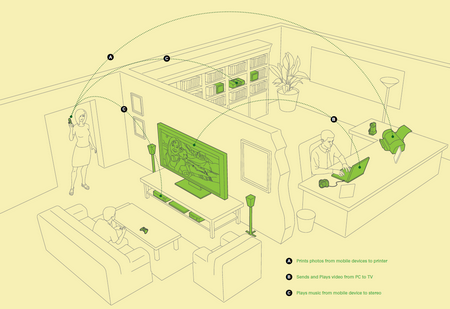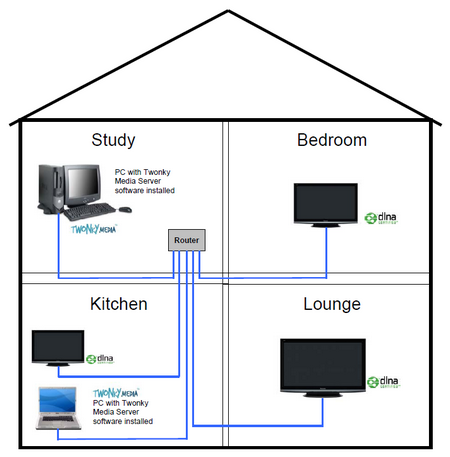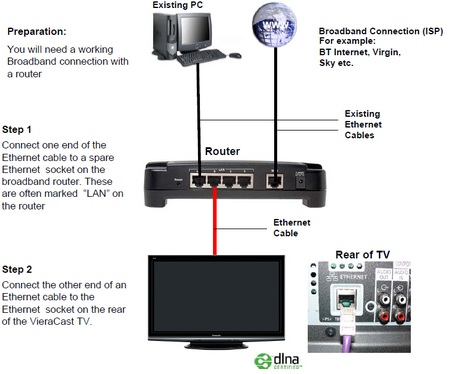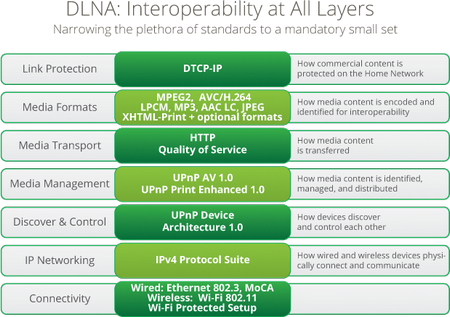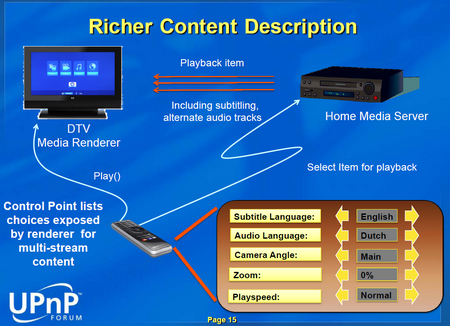What is DLNA?
DLNA = Digital Living Network Alliance
The DLNA sets standards and guidelines for home networking media devices. A device can receive a DLNA certification. This certification lets the consumer know that once connected to your home network, it will automatically communicate with other connected DLNA certified products.
DLNA certified devices can: find and play movies; send, display and/or upload photos, find, send, play and/or download music; and send and print photos.
The figure below is from DLNA’s marketing material showing some use cases.
A typical setup example is shown in 2 figures below. (This is from Panasonic, see links chapter). PC is used as Media Server, and TV is Media Server/Renderer.
DLNA Devices
ie. components in DLNA
Digital Media Player (DMP) – finds and plays media from other devices and computers.
Digital Media Server (DMS) – stores a media library. It may be a computer, a network attached storage (NAS) drive, a smartphone, a DLNA certified networkable digital camera or camcorder, or a network media server device.
Digital Media Renderer (DMR) – similar to a digital media player, it plays digital media. However, the difference is that this device can be seen by a digital media controller, and media can be streamed to it from a digital media server.
Digital Media Controller (DMC)- the go-between device that can find media on a Digital Media Server and send it to the Digital Media Renderer. Often smartphones, tablets, computer software like Twonky Beam, or even cameras or camcorders are certified as Digital Media Controllers.
Technical side
DLNA Interoperability Guidelines are not freely available. However, Discover & Control and Media Management are using UPnP, for which specifications are available.
What is UPnP?
upnp.org: The UPnP architecture offers pervasive peer-to-peer network connectivity of PCs of all form factors, intelligent appliances, and wireless devices. The UPnP architecture is a distributed, open networking architecture that leverages TCP/IP and the Web to enable seamless proximity networking in addition to control and data transfer among networked devices in the home, office, and everywhere in between.
UPnP standards are available here.
The figure below shows an example of Controller, Server and Renderer (from here).
Links
- DLNA for Dummies (Slides)
- Panasonic Self Help Guides: DLNA
- Certified products
- DLNA Interoperability Guidelines
Video Links
- What is DLNA?
- How to Set up a Home Network
- Sharing Pictures Using DLNA
- How To Use DLNA And External HDD On Your Viera TV
- Play To: An Overivew of Media Sharing in Windows 7
- contains both a video demo, and powerpoint of the presentation
- NAS Streaming Media (DLNA)
Note
Some media servers can deliver content from internet as well (see blog).

